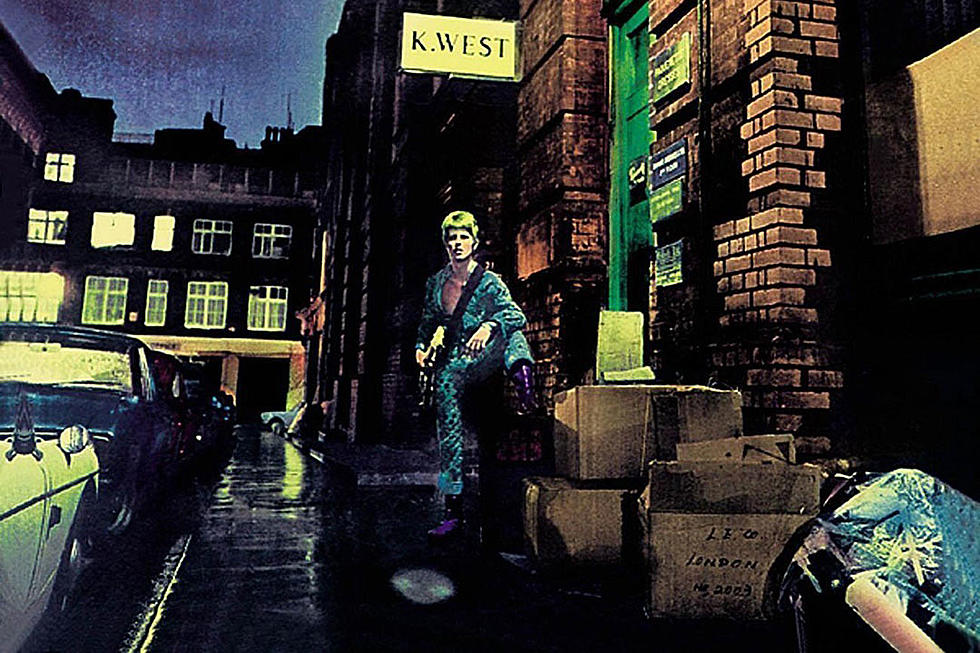
How David Bowie Created a Masterpiece With ‘Ziggy Stardust’
Rock 'n' roll became part of the mainstream when Elvis Presley crashed the gates in the mid '50s. The Beatles and Rolling Stones pushed further into culture in the '60s, but by the end of the decade fatigue had set in.
At the start of the '70s, rock 'n' roll was at a crossroads. The Beatles were gone, and hippie culture was alienating to some fans, especially younger ones. Then came David Bowie who, along with Alice Cooper and others, finally put rock on an exciting new course.
With links to mod, music hall and folk music, Bowie's past was littered with a variety of styles. "I'm just, by nature, a very flighty person," he later told the BBC. "I get turned on and off things all the time, very quickly."
He hit the charts in the summer of 1969 with "Space Oddity," but most of what followed failed to live up to that glory.
So, Bowie came up with a concept for a character based on influences ranging from the Velvet Underground to mime theater. Ziggy Stardust even came with his own band: the Spiders From Mars, which included bassist Trevor Boulder, drummer Woody Woodmansey and guitar virtuoso Mick Ronson. Bowie was ready for his next phase, which arrived on June 16, 1972.
The Rise and Fall of Ziggy Stardust and the Spiders From Mars was his fifth album, but it might as well have been Bowie's first. In retrospect, you can trace a line from LPs like The Man Who Sold the World and Hunky Dory right up to Ziggy, but it still seemed at the time that Ziggy Stardust appeared out of thin air and fully formed.
The conceptual story about a fictional futuristic rock star begins with "Five Years," which paints a picture of a doomed planet. With references to a dystopian world where "a cop knelt and kissed the feet of a priest, and a queer threw up at the sight of that," it was clear from the start that Ziggy's galaxy was light years away from the era's usual peace-and-love ethos.
Listen to David Bowie's 'Ziggy Stardust'
Ziggy Stardust's tale continues with songs like "Lady Stardust," which references fellow glam icon Marc Bolan; "Hang Onto Yourself," powered by a space-age Eddie Cochran riff that had a strong influence on the upcoming punk generation; and "Ziggy Stardust," the album's centerpiece that sets up the main character's story: "Ziggy really sang, screwed-up eyes and screwed-down hairdo / Like some cat from Japan, he could lick 'em by smiling / He could leave 'em to hang / 'Came on so loaded man, well hung and snow-white tan."
Then the closing "Rock and Roll Suicide" wraps up Ziggy's tale as it zeroes in on Bowie's growing fan base. "You're not alone," he sings. "No matter what or who you've been / No matter what or where you've seen / All the knives seem to lacerate your brain / I've had my share I'll help you with the pain / You're not alone."
The album was an international phenomenon. For countless kids in England, seeing Bowie perform "Starman" on Top of the Pops in 1972 was a defining moment. Released as a single prior to the album, it initially didn't fare too well on the charts, but following the TV appearance, it rocketed into the Top 10.
"'Starman' was the eureka moment in rock 'n' roll," Spandau Ballet's Gary Kemp said in a BBC documentary. "This creature appears on Top of the Pops, and he was so shocking, so androgynous, so other worldly." The impact wasn't lost on his peers either. "It was so different, it was like Wow," recalled Elton John. "No one had ever seen anything like that before."
Still, chart success was scattered. Even though The Rise and Fall of Ziggy Stardust and the Spiders From Mars went Top 5 in the U.K., it climbed to only No. 75 in the U.S. But its impact was felt over time. The follow-up, 1973's Aladdin Sane, became Bowie's first No. 1 album in the U.K., and he finally cracked the Top 20 in the U.S.
But while everyone was catching up to Ziggy and glam rock, Bowie was itching to move on. "I'd said all I could say about Ziggy," Bowie countered. "I'm very tempted to go further with this Ziggy thing only because it's so popular, but actually, it's not what I really want to do. I've created this bloody thing, how do I sort of get out of it?"
Within two years, Bowie abandoned Ziggy and re-imagined himself again. “He really grew, sort of out of proportion – got much bigger than I thought Ziggy was going to be," Bowie said. "Ziggy just overshadowed everything.”
The Rise and Fall of Ziggy Stardust and the Spiders From Mars would go on to become one of the most celebrated and influential rock 'n' roll albums of all time. We'll probably never see the likes of Ziggy, or Bowie, ever again.
Every David Bowie Single Ranked
More From Ultimate Classic Rock









